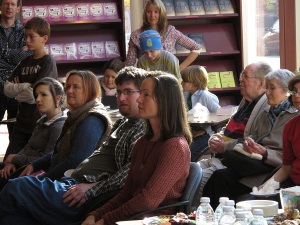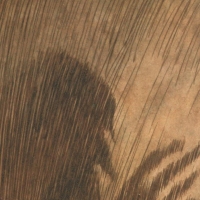Catherine Austen
Creative Writing
Who’s Afraid of Public Speaking? (Fearless February Day 2)
Glossophobia. The fear of speaking in public.
Also called “speech anxiety,” this is the most common phobia in North America. Three out of four people suffer from it — and we suspect there’s something wrong with that fourth guy. I mean, honestly, what kind of person isn’t afraid to stand up and deliver a speech? to lay bare his intelligence or lack of it? to stand there while people stare and listen and judge? to risk ridicule and exclusion from the all-important social ties that bind us???
It’s a tough fear to figure. Heights? Sure, that fear makes sense – you walk too close to the edge of a cliff, you fall off, you die. After hundreds of generations of natural selection, all the people with no fear of heights went over the edge and took their fearless genes with them, leaving us scaredy-cats alive and thriving.
But speech phobia? Why did we inherit that?
I’m guessing it was because most of the fearless blabbermouths in days of old stood up and said something stupid (or maybe just subversive) and got themselves killed for it. Or exiled, which amounted to the same thing. Or shunned or made a laughing stock, which aren’t good for finding mates and passing on your fearless genes. That left a lot of quiet scaredy-cats, plus a few folk who weren’t afraid to speak up but happened to have either (1) something worth listening to or (2) a bunch of friends who had their backs.
Scary Public Speaking Fact #1: William Henry Harrison, a former US President, delivered a long inaugural speech in the cold without a hat, caught pneumonia, and died. (This is as scary as it gets – public speaking will not rip you to pieces.)
It’s perfectly normal to get nervous before speaking in public. But if you rearrange your life to avoid it, you have a phobia. Here are some signs:
- You’d rather fail a subject than do an oral report;
- You decline to go to your own award ceremony because you’re afraid to stand up and say thank you;
- You’re kept awake at night dreading next week’s public speaking competition;
- Visions of yourself vomiting, collapsing or piddling your pants at a podium flash through your mind.
Once again, the cure is exposure therapy. Start slowly. Say “here” instead of just raising your hand during attendance. Walk in front of the class to get to your seat instead of sneaking behind all the desks. When that feels okay, try to say one thing out loud in class every day, then speak more and more until you’re okay with it. Finally, take the stage. Slowly. Read a story to first-graders before tackling older audiences. Recite your speech in front of one kind person before trying a group. Visualize yourself doing a good job. Take a few deep breaths and find an encouraging audience member. And when you’re done, give yourself a hand.
Scary Public Speaking Fact #2: Speech anxiety may increase your odds of having a heart attack during a speech. So chillax.
Most of us have good reason to relax: no one’s paying much attention. But some of us are up against the devil. If you’re in a class with a mean horrible kid (or teacher) who will never in a million years let your speech be a good experience, or if you live in a family where a parent or sibling always mocks or stomps on everything you say, or if your circle of friends includes some snotty kid who always makes you feel stupid, you need to find a different public to speak in front of – a library, an aunt’s house, a club, one friend. Every bad experience will entrench your fear, so find somebody who wants to hear what you have to say – even if it’s your dog (see Fearless February Day 1).
Scary Public Speaking Fact #3: In this day of iPods and smart phones, there’s a fair chance that someone will record your speech and publish it online.

I came across a recording of myself posted online, reading a scene from 26 Tips for Surviving Grade 6 at my book launch a couple of years ago. It was a shock to discover – terror immediately set in – but it wasn’t half bad. I didn’t appear nervous at all. You could be lucky like that, and appear calm while inwardly in a tizzy. (Or you could be like a guy named Steve from my university days who turned beet red and stammered through his presentations. It was painful to watch — but he was really cute so it was kind of endearing. Even if people always remember how nervous you were during your speech, they may remember it fondly. You never know.)
Scary Public Speaking Fact #4: A few leaders (of countries and protest movements) have been assassinated during speeches. But thousands of people have stood by quietly while millions of others were murdered – and that’s much scarier.
Having something to say is risky. But not saying what’s on your mind is riskier. This is a fear worth slaying.
 In 28 Tricks for a Fearless Grade 6, Andrew is so terrified of public speaking that he lies, cheats and fakes sick to avoid it. But you can’t get through school without speaking. So Dave Davidson and his friends use their fear-slaying techniques – plus cue cards, affirmations, and distractions – to get Andrew through his three-minute speech (not quite fearlessly but at least without falling to pieces).
In 28 Tricks for a Fearless Grade 6, Andrew is so terrified of public speaking that he lies, cheats and fakes sick to avoid it. But you can’t get through school without speaking. So Dave Davidson and his friends use their fear-slaying techniques – plus cue cards, affirmations, and distractions – to get Andrew through his three-minute speech (not quite fearlessly but at least without falling to pieces).
You can do it, too.








I want to start promoting my book but I’m scared poopless! I must get over it… or buy diapers!
OMG, getting over it is definitely the better choice in this particular instance.
I don’t like self-promotion, either. Platform shmatform (or shatform in this case, perhaps). But it’s more and more part of the book industry – ew. (Actually, some parts of it I like. I like talking to classes of kids, if that counts.)
Tell me about your book, Cathy – that’s a start. (I’ll be encouraging, I promise.)
Wonderful post and your book looks great–I’ll have to check it out. I’ve been promoting my own first book these past months and never thought I’d get through the book launch speech or a later television interview, but somehow I survived. 🙂 I think the older I get, the more I realize it’s important to just do it (whatever IT may be). Many people seem to do well with Toastmaster groups for practicing in front of strangers.
Thank you, Marcia. I’m sure you’ll find, like I did, that it gets easier with practice (discovering that you don’t make a fool of yourself and people actually are interested helps a lot). Occasionally I’ll get overwhelmingly terrified still – intrusive thoughts, nausea, cold sweats, the works – while other times I’ll be happy and excited to speak. Being prepared helps – not with a speech word for word, but with a good sense of what I want to say in what order. (And getting older helps with everything social, I find. It’s easier to see us all in the same boat and just be happy that someone’s listening.)
Catherine:
Good tips, but the 75% statistic is highly questionable. I don’t think anywhere near that percent of people in North America suffer from public speaking phobia. A better estimate for U.S. adults is that 21.2% fear it and just 107% have a phobia. See:
http://joyfulpublicspeaking.blogspot.com/2013/11/how-scary-is-public-speaking-or.html
An article published in 2000 found 15.1% of Canadian adults in Alberta and Manitoba feared public speaking (5 times fewer people):
http://joyfulpublicspeaking.blogspot.com/2009/11/how-to-get-beyond-just-using-worn-out.html
Another article published in 2010 found 17.3% of those in the Canadian military feared performing/giving a talk in front of an audience:
http://joyfulpublicspeaking.blogspot.com/2013/08/performing-or-giving-talk-in-front-of.html
Richard
Aha, so maybe this is like the “we only use 10% of our brains” myth? Well, I must say the 75% statistic is everywhere, from Psychology Today to the National Institute of Mental Health to Toastmasters to the TED talks blog and everywhere in between. It is the only statistic people looking for a statistic can find. I don’t know where it originated, but maybe it’s the statistic people like to use because everyone publishing that statistic has some degree of speech anxiety?
I think it’s pretty normal to be nervous when speaking in public – we are social animals, after all; identity is dearer to us than most other things, and what we say in public affects our identity. It would be odd for our species to evolve without a little nervousness to caution us before we open our mouths.
But being nervous or afraid is not the same as a full-blown phobia, of course. Phobias of any sort are rare. And while most of us may be jittery when we’re heading to the podium, the true phobics, a far smaller fraction of us, won’t go up to that podium at all.
We tend to use the word “fear” and “phobia” a little too interchangeably, and maybe that’s where the statistical ballooning happens.
(And we use our entire brains. What kind of animal would grow such massive brains, endangering mother and infant at every birth, to only use 10%? Sheesh. We’d have been wiped out by pinheads eons ago.)